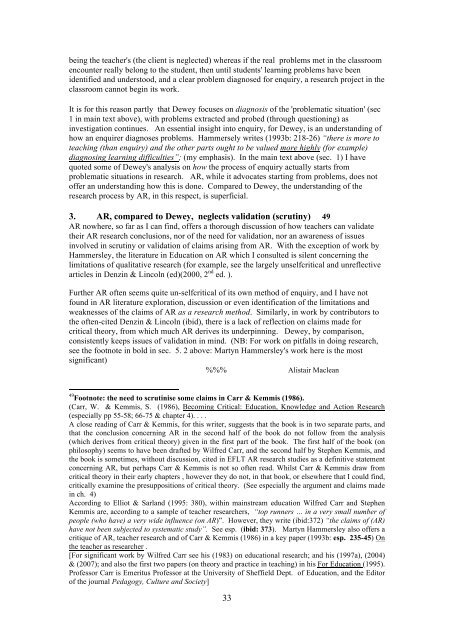RADICAL TEFL
2hqhXJd
2hqhXJd
You also want an ePaper? Increase the reach of your titles
YUMPU automatically turns print PDFs into web optimized ePapers that Google loves.
eing the teacher's (the client is neglected) whereas if the real problems met in the classroom<br />
encounter really belong to the student, then until students' learning problems have been<br />
identified and understood, and a clear problem diagnosed for enquiry, a research project in the<br />
classroom cannot begin its work.<br />
It is for this reason partly that Dewey focuses on diagnosis of the 'problematic situation' (sec<br />
1 in main text above), with problems extracted and probed (through questioning) as<br />
investigation continues. An essential insight into enquiry, for Dewey, is an understanding of<br />
how an enquirer diagnoses problems. Hammersely writes (1993b: 218-26) “there is more to<br />
teaching (than enquiry) and the other parts ought to be valued more highly (for example)<br />
diagnosing learning difficulties”; (my emphasis). In the main text above (sec. 1) I have<br />
quoted some of Dewey's analysis on how the process of enquiry actually starts from<br />
problematic situations in research. AR, while it advocates starting from problems, does not<br />
offer an understanding how this is done. Compared to Dewey, the understanding of the<br />
research process by AR, in this respect, is superficial.<br />
3. AR, compared to Dewey, neglects validation (scrutiny) 49<br />
AR nowhere, so far as I can find, offers a thorough discussion of how teachers can validate<br />
their AR research conclusions, nor of the need for validation, nor an awareness of issues<br />
involved in scrutiny or validation of claims arising from AR. With the exception of work by<br />
Hammersley, the literature in Education on AR which I consulted is silent concerning the<br />
limitations of qualitative research (for example, see the largely unselfcritical and unreflective<br />
articles in Denzin & Lincoln (ed)(2000, 2 nd ed. ).<br />
Further AR often seems quite un-selfcritical of its own method of enquiry, and I have not<br />
found in AR literature exploration, discussion or even identification of the limitations and<br />
weaknesses of the claims of AR as a research method. Similarly, in work by contributors to<br />
the often-cited Denzin & Lincoln (ibid), there is a lack of reflection on claims made for<br />
critical theory, from which much AR derives its underpinning. Dewey, by comparison,<br />
consistently keeps issues of validation in mind. (NB: For work on pitfalls in doing research,<br />
see the footnote in bold in sec. 5. 2 above: Martyn Hammersley's work here is the most<br />
significant)<br />
%%% Alistair Maclean<br />
49 Footnote: the need to scrutinise some claims in Carr & Kemmis (1986).<br />
(Carr, W. & Kemmis, S. (1986), Becoming Critical: Education, Knowledge and Action Research<br />
(especially pp 55-58; 66-75 & chapter 4). . . .<br />
A close reading of Carr & Kemmis, for this writer, suggests that the book is in two separate parts, and<br />
that the conclusion concerning AR in the second half of the book do not follow from the analysis<br />
(which derives from critical theory) given in the first part of the book. The first half of the book (on<br />
philosophy) seems to have been drafted by Wilfred Carr, and the second half by Stephen Kemmis, and<br />
the book is sometimes, without discussion, cited in EFLT AR research studies as a definitive statement<br />
concerning AR, but perhaps Carr & Kemmis is not so often read. Whilst Carr & Kemmis draw from<br />
critical theory in their early chapters , however they do not, in that book, or elsewhere that I could find,<br />
critically examine the presuppositions of critical theory. (See especially the argument and claims made<br />
in ch. 4)<br />
According to Elliot & Sarland (1995: 380), within mainstream education Wilfred Carr and Stephen<br />
Kemmis are, according to a sample of teacher researchers, “top runners … in a very small number of<br />
people (who have) a very wide influence (on AR)”. However, they write (ibid:372) “the claims of (AR)<br />
have not been subjected to systematic study”. See esp. (ibid: 373). Martyn Hammersley also offers a<br />
critique of AR, teacher research and of Carr & Kemmis (1986) in a key paper (1993b: esp. 235-45) On<br />
the teacher as researcher .<br />
[For significant work by Wilfred Carr see his (1983) on educational research; and his (1997a), (2004)<br />
& (2007); and also the first two papers (on theory and practice in teaching) in his For Education (1995).<br />
Professor Carr is Emeritus Professor at the University of Sheffield Dept. of Education, and the Editor<br />
of the journal Pedagogy, Culture and Society]<br />
33


